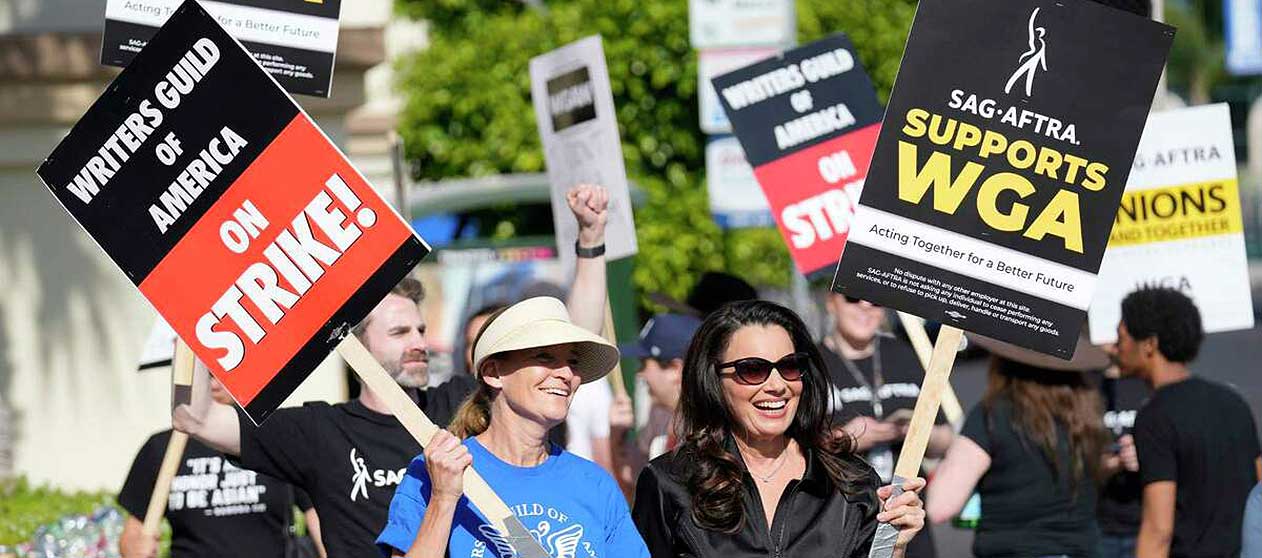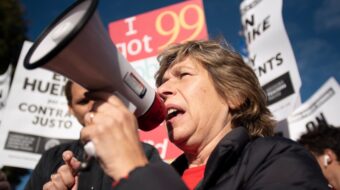
LOS ANGELES—After more than four weeks of fruitless talks between SAG-AFTRA and movie, television, Netflix, and streaming video producers forced the union to strike, starting July 13, SAG-AFTRA President Fran Drescher said.
Such a strike marks the first time in 63 years that unions of both those crafts and writers for movies and theater are simultaneously pressing their demands on the picket lines.
The issues facing both SAG-AFTRA and the Writers Guild of America are almost identical: Pay that lost much of its value to inflation during the last several years, disappearing residuals, declining work time for each show—which also cuts pay—and the looming threat of artificial intelligence.
AI would let the moguls substitute computer-generated scripts and images for real people.
“The Association of Motion Picture and Television Producers’ (AMPTP),” responses to the union’s most important proposals have been insulting and disrespectful of our massive contributions to this industry,” Drescher and chief union negotiator Duncan Crabtree-Ireland said.
“The companies have refused to meaningfully engage on some topics and on others completely stonewalled us. Until they do negotiate in good faith, we cannot begin to reach a deal.”
The studios’ scheme may actually be to smash the workers into submission, one anonymous executive told an industry insider publication, Deadline.
“The endgame is to drag things on until union members start losing their apartments and start losing their houses,” the executive said. The prediction is that would occur by October. Another insider called the tactic “a cruel but necessary evil.”
The union originally planned to strike on June 1, but postponed the walkout because the two leaders said there was “progress” in bargaining, with AMPTP, whose members include Amazon, Apple, Disney, NBCUniversal, Netflix, Paramount, Sony, and Warner Bros.-Discovery. But movement then disappeared.
“Over the past decade, your compensation has been severely eroded by the rise of the streaming ecosystem. Furthermore, artificial intelligence poses an existential threat to creative professions, and all actors and performers deserve contract language that protects them from having their identity and talent exploited without consent and pay,” the two union leaders said.
“The AMPTP has refused to acknowledge enormous shifts in the industry and economy has” on the workers, they added. “The AMPTP’s responses to our proposals have not been adequate.”
The forced strike drew immediate support from other unions whose members are involved in the performing arts, including the Writers Guild’s two sectors—East for theatrical actors and West for Hollywood actors.
Theatrical and Stage Employees President Matthew Loeb drafted their joint statement of solidarity, noting that it covers the Hollywood Basic Crafts coalition. That coalition includes locals from the Teamsters, Electrical Workers (IBEW), the Laborers, the Plumbers and Pipefitters and the Plasterers and Cement Masons.
“Hollywood must be a place where every worker, on-screen and off, is treated according to the value their skills and talents command,” the joint statement said.
“While the studios have a collective worth of trillions of dollars, billions of viewers globally, and sky-high profits, this fight is not about actors against the studios, but rather about workers across all crafts and departments in the industry standing together to prevent mega-corporations from eroding the conditions we fought decades to achieve.”
Wikipedia reports the last time the writers and actors went on strike at the same time was in 1960, “when Ronald Reagan was president of the Screen Actors Guild, and residuals for films shown on television was the fight du jour.”
As for the moguls themselves, Disney CEO Bob Iger, who signed a two-year $27-million-er-year contract extension the day before the board’s vote, told CNBC “This is the worst time in the world” for a strike. He also lumped SAG-AFTRA and the Writer’s Guild together in his criticism.
“There’s a level of expectation that” the two unions “have that is just not realistic,” he said.












Comments